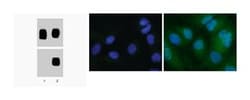Learn More
p38 MAPK (pT180/pY182) Mouse, Unlabeled, Clone: 36/P38 (PT180/PY182), BD
Mouse Monoclonal Antibody
Supplier: BD Biosciences 612289
Description
Activation of the immune and inflammatory responses often involves the recognition of bacterial endotoxin (lipopolysaccharide or LPS). Binding of LPS by monocytic cells results in the production and release of proinflammatory cytokines, such as IL-1 and TNF-α. LPS-induced signaling cascades involve members of the Ser/Thr protein kinase family known as the mitogen activated protein kinases (MAPKs). MAPK signal transduction pathways mediate the effects of various extracellular stimuli on biological processes such as proliferation, differentiation, and death. The p38 MAP kinases include p38α, β, γ, and δ. These ser/thr kinases are activated by dual phosphorylation on Thr and Tyr within the motif Thr-Gly-Tyr located in kinase subdomain VIII. Activation of p38 MAPK is mediated specifically by the MAP kinase kinases, MKK3, MKK4, and MKK6. This leads to the activation of multiple transcription factors (NF-κB, ATF-2, Elk-1, and CHOP) that induce expression of many different genes, including proinflammatory cytokine genes. Thus, p38 MAPKs are central kinases in muliple signal transduction pathways.
Immunofluorescence, Intracellular Staining, Western Blotting

Specifications
| p38 MAPK (pT180/pY182) | |
| Monoclonal | |
| 250μg/mL | |
| MAPK14; p38 MAP kinase; p38 MAPK; RK; CSBP2 | |
| Mouse | |
| Affinity Purified | |
| RUO | |
| Primary | |
| Store undiluted at -20°C. |
| Western Blot | |
| 36/P38 (PT180/PY182) | |
| Unconjugated | |
| Aqueous buffered solution containing BSA, glycerol, and ≤0.09% sodium azide. | |
| Phosphorylated Human p38 MAPK (pT180/pY182) Peptide | |
| 150 μg | |
| Cell Biology | |
| Human, Mouse, Rat | |
| IgG1 κ |
Your input is important to us. Please complete this form to provide feedback related to the content on this product.
For Research Use Only.

